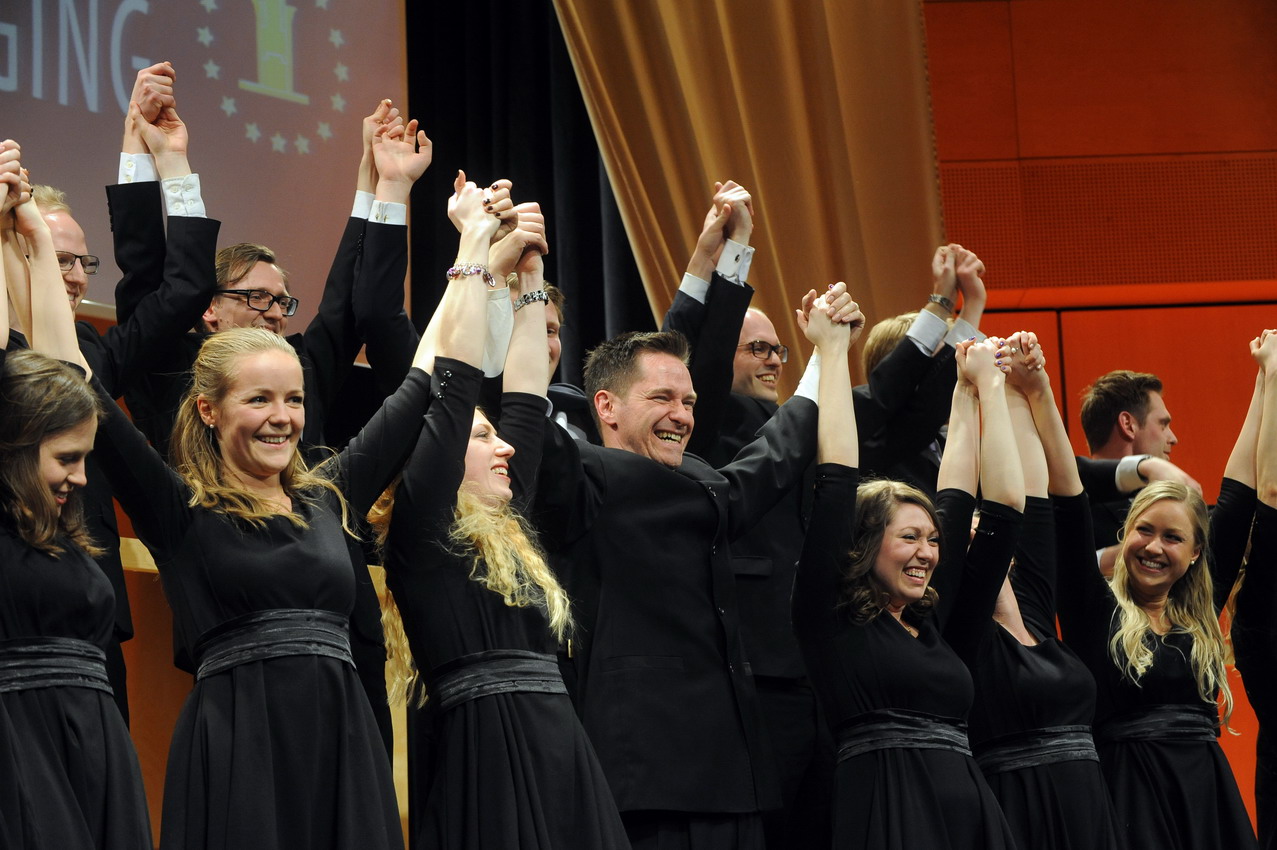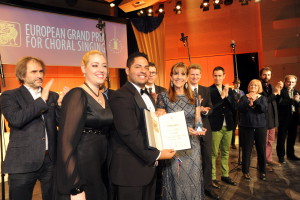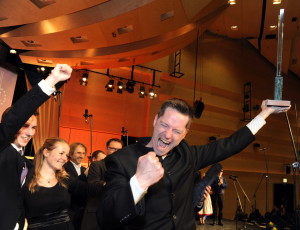By Zsuzsanna Zsoltné Szesztay, music educator and violin teacher
On March 21-22, 2014, the attention of the European choral world once again turned to Debrecen, Hungary – the long established home of the biennial Béla Bartók International Choir Competition for over fifty years – where Grand Prix-winners of major European choir contests assembled to meet and measure themselves against each other at the 2014 European Grand Prix for Choral Singing (EGP).
The idea of the EGP, which aims to bring together the winners of previous competitions, was conceived back in 1988 by the European Grand Prix for Choral Singing Association, and since then the contest itself has been hosted and coordinated on a rotating basis by the organizing committees and member cities of the following choral competitions:
- Concurso Coral de Tolosa (Tolosa Choral Competition) – Tolosa, Basque Country, Spain
- Concorso Polifonico Guido d’Arezzo (International Guido d’Arezzo Polyphonic Contest) – Arezzo, Italy
- Florilège Vocal de Tours (Tours Vocal Competition) – Tours, France
- International Choir Competition – Maribor, Slovenia
- International May Choir Competition ‘Prof. G. Dimitrov’ – Varna, Bulgaria
- Béla Bartók International Choir Competition – Debrecen, Hungary
This year, for the fourth time and the first time since 2008, the Béla Bartók International Choir Competition was given the opportunity to host the annual event in which all Grand Prix-winners of each of the above competitions contended for the European choral title. Not surprisingly, for both choirs and their conductors the prestigious prize itself has meant the launch of many international careers and also led to further invitations to perform on an international level. However, 2014 saw only four choirs treading the choral boards at Debrecen’s Kölcsey Convention Centre, as opposed to the usual six-choir setup, due to the fact that Varna had withdrawn from organizing its own choir competition last year.
The main sponsors of EGP 2014 were Debrecen City Council, the Hungarian Ministry of Human Resources and the National Cultural Fund, and the jury was composed of eminent representatives of the international choral scene: Aarne Saluveer, conductor, choir director, board member of the International Federation for Choral Music (Estonia), Carlo Pavese, composer, choir director, vice-president of the European Choral Association–Europa Cantat (Italy), Máté Szabó-Sipos, choir master and conductor of the Hungarian State Opera (Hungary), Ursa Lah, choir master of Finnmark Opera Choir (Slovenia), Tamás Beischer-Matyó, Erkel Prize-winner composer and teacher of the Liszt Ferenc Academy of Music, Budapest (Hungary), Stephen Connolly, former member of King’s Singers, currently director of the International A Capella School (United Kingdom) and Theodora Pavlovitch, conductor of the Sofia Chamber Choir and vice-president of the Executive Committee of IFCM (Bulgaria).
On March 21, a major opening concert was held featuring a vibrant program of contemporary choral works written by Hungarian composers such as György Selmeczi, Miklós Csemiczky, Péter Tóth, Márton Levente Horváth, Gyula Fekete, Tamás Beischer-Matyó, György Orbán and János Vajda. The pieces, which were performed by the internationally acclaimed Debrecen-based Kodály Choir under the baton of Mr Zoltán Pad, also served as a timely reminder that Debrecen and its resident Béla Bartók International Choir Competition have always been an important platform for showcasing and promoting new works by emerging Hungarian composers.
On the following day, after the international jury’s morning assembly, the contest commenced in the afternoon, offering a colourful, high-quality program which introduced leading ensembles from Irish, Puerto Rican, and Swedish choral traditions. Each choir presented its own unique selection of predominantly 20th and 21st century music, and their performances were also broadcasted live on the Hungarian classic music radio, Radio Bartok.
The competition itself started with the spirited performance of the Stockholms Musikgymnasium Chamber Choir, a fine representative of the Scandinavian choral scene, which since its foundation in 1989 has been involved in diverse projects including those organized by the Swedish Radio and which, among others, also made appearances at Stockholm’s triennially held New Music Festival. Since 2002 the Choir has gradually garnered international accolades under conductor Helen Stureborg by winning First Prizes at international choir competitions (Marktoberdorf 2009, Maribor 2013). Under Ms Stureborg’s charismatic leadership, the choir presented a well-prepared and brilliantly nuanced program featuring a wealth of outstanding vocal talent.
The afternoon’s second contestant was Ireland’s award-winning vocal ensemble New Dublin Voices, led by conductor Bernie Sherlock, which gained international recognition primarily through its sophisticated performances of contemporary works. The choir, which has also performed a number of Irish and world premieres, won numerous prizes at French, German, Hungarian, Finnish, Belgian, and Spanish choir contests. In August 2013 it was awarded First Prize by the jury of Arezzo’s International Guido d’Arezzo Polyphonic Contest, and thus becoming the first Irish choir to be invited to participate at a European Grand Prix. Bringing a subtle exotic flavour to the contest, it was a pleasure to listen to New Dublin Voices’ meticulously elaborated interpretations of their chosen works; in particular, the sweepingly dramatic delivery of Kodály’s ‘Öregek’ (The Elderly) deserves special praise for its superb Hungarian pronunciation.
Similar to the above choirs, the performance of the third contestant Coralia, concert choir of the University of Puerto Rico, was also warmly received by the audience. Based on a long-established choral tradition that dates back to 1936, Coralia, led by conductor Carmen Acevedo-Lucio, developed a sophisticated repertoire that includes pieces from a wide array of musical periods. Lately, the choir became prize-winner of many international competitions, including winning the 2013 Grand Prix at the Florilége Vocal de Tours in France, thus qualifying for entering this year’s EGP. Interestingly, their Debrecen performance not only demonstrated their firm musical knowledge and extensive concert experience in choral singing, but also displayed their particular skills at bringing out extremities of dynamics in their interpretations.
The performance of Swedish youth choir Sankt Jacobs Ungdomskör, which was founded in 2007 and has already gained recognition on an international level, brought to a close the contest’s program. In 2013 the Ungdomskör won all five prizes at the Tolosa Choral Competition in Spain, and therefore also received an invitation to this year’s EGP. Conducted by Mikael Wedar, the Stockholm-based choir presented a highly engaging performance of their uniquely modern repertoire which was delivered with true musical artistry and style.
Having considered each relevant aspect of all choral performances, at the evening’s Award Ceremony the jury found the performance of the Mikael Wedar-led youth choir to be the most outstanding, therefore, followed by unanimous applause from both the audience and its fellow contenders, the Sankt Jacobs Ungdomskör was awarded the 2014 European Grand Prix.
Personally, having heard all four performances of the competition I was astonished to witness the level of vocal expertise of each of these choirs which are also representatives of the world’s best choral traditions. Indeed, this competition was an exemplary exhibition of all the key values of choral singing which can rarely be experienced during traditional choir contests – not even by experts accustomed to performances of the highest standards. Interestingly, without exception, the selected repertoire of each participating vocal ensemble contained works that featured a variety of avant-garde elements including declamation, imitation of sounds, speech, shouting and other vocal elements. Nonetheless, these choral ‘special effects’ never obscured the overall presence of each choir’s unquestionable musical values and their clear understanding of traditional norms in choral singing. Due to the high number of individually trained singers, all choirs had fantastic voices and invited their listeners to a journey into their own exquisite realms of sound.
Thanks to the arduous work of the artistic board and organizing team of the European Grand Prix for Choral Singing, this year’s competition has truly become a festive occasion for both the participating ensembles and the city of Debrecen. I sincerely hope that these world-class choirs will soon be in demand on the international concert scene, and – as part of their future concert series – they will also make a welcome return to the city of Debrecen.
Edited by Jonathan Aaron Baudhuin, Germany



